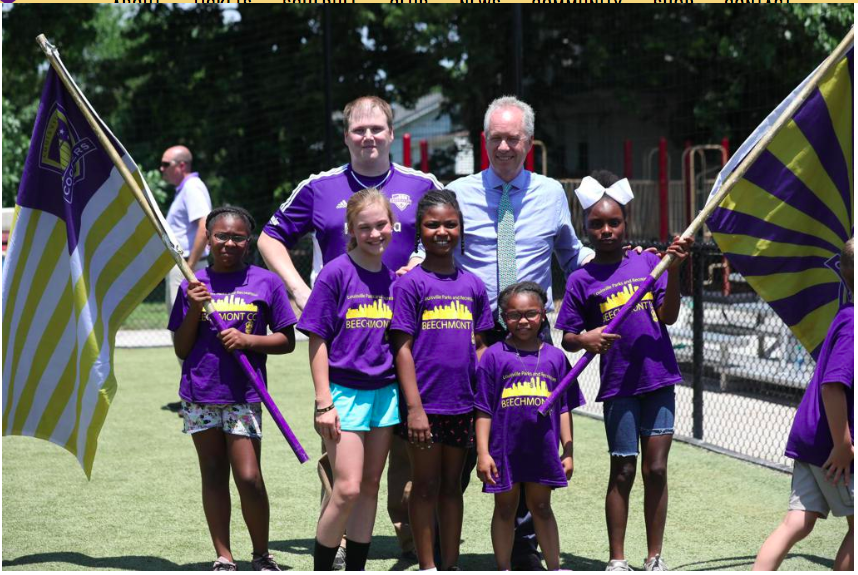Yesterday, lots of Louisville City fans got an email in their inbox announcing the schedule for the club’s first ever series of comprehensive summer soccer camps. If you’ve ever been involved in youth soccer, these things are a pretty normal summer event since most youth leagues don’t play or really train together between the end of May and the beginning of August. Local youth clubs, local colleges like Bellarmine, Spalding, and UofL, and sometimes traveling coaching clinics from Barcelona and Real Madrid hold these things throughout those months. So, when I got the email, I basically compartmentalized it as a new competitor in that same market. An option that I might send one or both of my age-eligible kids to play in if the schedules worked out.
Then, our good friend and emissary Jorje Pazmino tweeted this:
Jorje brings up an excellent point: youth soccer in the States, in general, prices out a whole lot of people that would like to play the game but just can’t afford to. It’s not like the US is the only place on earth that has pay-to-play soccer, to say nothing of all of the other sports in this country that have similar participation barriers. Unless you make the high school football team, the only chance you’ll have to play American football is by paying to play in a Pop Warner league, or in a private school league where you’re already paying for tuition in the first place. The same is true for baseball, basketball, swimming, lacrosse, golf, tennis, etc. These sports aren’t free to play, by and large.
A counterpoint to the traditional pay-to-play model is the European or South American club model, where most of the clubs in the top leagues bring players in to develop under their supervision for free. However, there are barriers to those sorts of situations, too. Ajax isn’t just letting any schmoe off the street join their academy; you have to have some glimpse of first-team potential to their scouts before you get to go on an all-expenses paid trip to Amsterdam. It’s true that many clubs around the world have setups that aren’t geared toward professional development, but you still have to be a member of the club to participate in those settings, and memberships aren’t free, either.
The “free academy” concept isn’t as wide-spread as some would like to believe, either. The Bundesliga only began requiring member clubs to have academies in the last 20 years. Many smaller clubs in England that aren’t in the top flight have pay-to-play academies. Some don’t have academies at all. MLS clubs are now required to have academies, but that’s a relatively recent development, too, and not all clubs’ academies are free. DC United, who historically has produced some very good domestic talent in the past quarter century, still charges its players a fee to play there.
However, especially in soccer circles, there has been a significant movement of late to try and remove the pay-to-play barrier for soccer. Soccer in the Streets and the US Soccer Foundation have been working hard to develop spaces for anyone to play small-sided games in urban settings for quite some time now. Louisville City, to their credit, has begun to partner closely with the Louisville Parks Foundation to install free futsal fields in South Louisville.
I’m glad Brad Estes responded to Jorje. I’m eve more glad to know that Mario Sánchez has been putting on free clinics. I’d love to know why THIS was the format in which we first learned about it? It’s not hard to understand why Mario was hired, but if he’s out putting on free clinics, I think that’s something the club should be trumpeting the hell out of. Not beforehand, maybe, because there’s the risk that the people other than those who are supposed to benefit, i.e. underprivileged kids, try to sneak in and get a free coaching session. But afterwards? Plaster it all over the website that you own! Call the Courier-Journal and have them bring a photog to see the awesome work you’re doing! This is a really good PR opportunity, and it seems like it might be going to waste.
Of course, there’s the possibility that keeping these things low-key is intentional, and maybe broadcasting it all over the place could be seen as some kind of exploitation. I don’t know.
Moving on. Places to play are absolutely key for growing the game. Louisville City deserves credit for jumping into that arena. But the next step is coaching and leagues. That’s where the money part comes back in.
Soccer coaches in the US don’t make a whole lot of money. My son’s U9 coach runs skills clinics three to five times per week, coaches two or three competitive youth teams, and is an assistant for Spalding’s staff. He had to do all that just to make ends meet; and he does it because he loves it. It also costs money to set aside time to train and practice, to maintain fields, for games, for insurance to put on tournaments, to pay referees, etc. If you and your friends just go outside with a ball, it’s free to play. But if you want to bring any semblance of organization to the game, someone’s gonna need to get paid.
THAT’s the arena I think Louisville City could really do some good in. Start a foundation (if they haven’t already, I can’t specifically recall). Wealthy people love foundations because a) it makes them feel good about helping the community and b) it provides a tax write-off. Or did until the recent tax cut bill, now I’m not so sure. Either way, they’re a win-win. Anyway, start a foundation that can fund field time, coaching, clinics, camps, and leagues in Portland and South Louisville. The return on investment is easy: more exposure for the club in those neighborhoods, possible increase in ticket purchases, free advertising in the form of gear give-aways, simple good will. And who knows, maybe the next great soccer player from Louisville gets a start in one of these camps or clinics, joins a foundation-sponsored league, and finds their way into a Louisville City roster one day. What a story that would be.
To circle back to the conversation Jorje started: I completely agree that putting price tags on summer soccer camps prices out kids with talent that can’t afford the fee. I also understand, from the club’s perspective, that hosting soccer camps costs money. Funding scholarships costs time and money. Throwing more paperwork into the mix to determine who qualifies for a need-based soccer camp scholarship is just another barrier to entry. Some folks are embarrassed to apply, others think it’s too time consuming, and then there’s the heartbreaking job of the person who’s got to decide who’s deserving and who isn’t.
It’s a much more difficult proposition than just “making it free.” But a foundation to help close that gap sounds like a good start to me.







